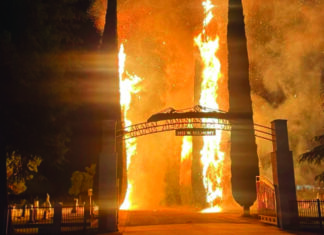By Muriel Mirak-Weissbach
Special to the Mirror-Spectator
BERLIN — The resolution on the Armenian Genocide, long awaited by the Armenian community especially in the diaspora, and long-feared by the Turkish establishment, is set to be put to a vote on June 2. As the Mirror-Spectator goes to press before that date, it is impossible to predict here how the proceedings will unfold and what they will yield. What is possible, however, is to present the content of the resolution, based on a draft proposal leaked to the press a few days before — a draft which as such is subject to changes in the course of the actual debate — and to sketch the parameters of the political debate it has unleashed.
The unified text agreed upon by the parliamentary factions of the Christian Democratic Union/Christian Social Union (CDU/CSU), Social Democratic Party (SPD) and Green Party, is entitled, “Remembering and Commemorating the Genocide against the Armenians and other Christian Minorities in 1915 and 1916.” In a series of premises, the Bundestag presents its position before listing demands it makes on the government.
The Bundestag honors “the victims of the expulsions and massacres of the Armenians and other Christian minorities of the Ottoman Empire which began over 100 years ago.” These “crimes of the then-Young Turk government … led to the near total extermination of the Armenians in the Ottoman Empire” and victimized other Christian communities, “especially the Aramaen/Assyrian and Chaldean Christians.” It was a “systematic expulsion and extermination of over one million ethnic Armenians.” To characterize it as genocide, the text cites a formulation used last year on April 24, 2015, by President Joachim Gauck, and repeated in the Bundestag debate that followed the next day: “Their destiny stands as exemplary for the history of mass murders, ethnic cleansing, expulsions, yes Genocide, which characterized the 20th century in such a terrible way. At the same time we know the uniqueness of the Holocaust, for which Germany bears guilt and responsibility.”
Further reference is made to last year’s commemoration: “On the centenary, April 24, 2015, speakers of all parliamentary factions in their debate and the German president on the evening before it, condemned the Armenian genocide, commemorated the victims and called for reconciliation.” And, as was the case a year earlier, the role of Germany is cited: “The Bundestag regrets the ignominious role of the German Empire, which, as the Ottoman Empire’s leading military ally, despite unequivocal information also from German diplomats and missionaries about the organized expulsion and extermination of the Armenians, did not try to stop these crimes against humanity.” And: “The German Empire shares the blame for the events.” Due to its complicity, Germany bears “a special historical responsibility” to facilitate the process by which Turks and Armenians work through the past in pursuit of understanding and reconciliation. This point is reiterated and elaborated, as the Bundestag expresses its support for all initiatives leading in this direction and urges the government to pursue the same. This refers not only to relations between Armenians and Turks but also to the state-to-state relations, whose improvement is “also important for the stabilization of the Caucasus region.” The text furthermore notes the “task for education in Germany, in schools, universities and political formation to take up study of the expulsion and extermination of the Armenians, including it in curricula and textbooks, as part of the study of the history of 20th century ethnic conflicts, to transmit this to future generations.”









